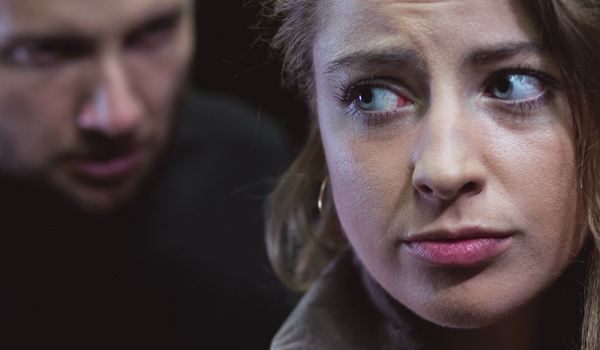More than half of women do not feel safe on London streets, survey reveals
More than half of women do not feel safe on the streets of London, while nearly a half have been followed and more than a quarter have been physically or sexually assaulted, according to an exclusive survey for ITV News London.
In an special report to be shown on ITV News London at 6pm tonight (June 25) figures reveal the extent to which women in the capital are subjected to harassment and abuse every day.
Among the survey findings:
- 57 per cent of women said they do not feel safe on the streets of London;
- 47 per cent of women have been followed at least once;
- 50 per cent have been verbally abused; and
- 27 per cent have been physically or sexually assaulted.
The Government has committed to halving violence against women and girls (VAWG) within a decade but the ITV News London survey reveals nearly half of women in London feel less safe than five years ago.
In an exclusive interview with ITV News London, Jess Phillips, the Minister for Safeguarding and Violence Against Women and Girls, said she was “saddened” but not surprised by the figures, adding: “Every woman I know has been harassed at some point in their life.
“I remember having to break the door of a toilet down because my friend had been spiked and I could see her legs underneath it.
“In a nightclub, people would pull up in a car next to you, certainly when you were in a school uniform, sort of ask you to get in the car. The kind of thing now that when I repeat it back, it seems absolutely harrowing,” she added.
Asked about nearly half of women surveyed being followed at last once in their life, Ms Phillips said: “That is quite shocking… and I can see the thought process.
“Trying to plan as you’re walking or somebody’s following you or you perceive that somebody is following you. That is a harrowing thing.”
Ms Phillips said the case of Sarah Everard was moment of social change where people “properly started to care”.
Ms Everard, 33, was abducted, raped and murdered by serving Metropolitan Police Service (MPS) officer Wayne Couzens as she walked home in London in 2021.
“I think it was a social change where the country properly started to care,” the minister added.
“I’m not saying they didn’t care before, I’m saying they realised what women were tolerating in the public realm and it became much more of a pertinently political issue.
“But what I would say to the fact that people feel less safe is that changing the cultural norms of generations is going to take time.
“That’s both the norms within institutions that deal with this, the norms within people’s behaviours; this doesn’t change. Like this doesn’t happen overnight and it is going to take a huge effort to get there.”
The MPS said it was dealing with a growing number of reports. Deputy Assistant Commissioner Ben Russell added: “Part of the challenge of VAWG is the volume. We are receiving thousands and thousands of reports every year.
“What we know is important is not always the outcome of the investigation but the process, how we treat the victims and how we communicate even with witnesses and being able to share as much information as possible and treat victims with respect and with dignity is absolutely critical.
“We know we have got more to do to get to where we want to be. But it’s something that is important and we all recognise that.”
The survey also revealed more than half of women (58 per cent) believed London’s Mayor, Sir Sadiq Khan, was not doing enough to keep women safe. Only ten per cent trusted the MPS to keep them safe.
Sir Sadiq told ITV News London it was important men understand the experiences of women and girls, adding: “We’ve got a situation across the country where every three days a woman is killed at the hands of a man and across the globe it is every ten minutes.
“We’re doing our bit from City Hall, but we can’t do it ourselves. That’s why we are working really closely with the police, with the courts, with the CPS, with the judiciary, but also schools. It’s got to start from primary school.
“We’ve made sure we get involved in public education, made sure boys understand about healthy relationships and about respecting, women, changing the law in relation to making public harassment of women in the public space of criminal offence, recording examples of misogyny, but also invest in record sums in tackling violence against women and girls.”
More than half of women surveyed (51 per cent) said they would feel safer with more police on the streets, while 41 per cent wanted tougher prison sentences for people convicted for violent crimes against women. And around a third wanted more CCTV in publics areas.
Survey conducted by Survation on behalf of ITV News London


